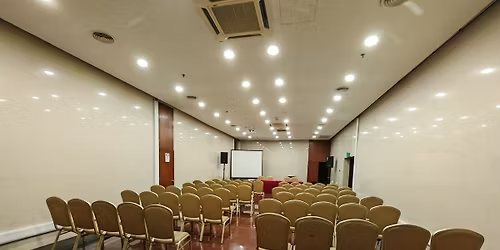Seminar Series: Prof. Jong-Wha Lee
Schedule
Wed Aug 27 2025 at 01:00 pm to 02:00 pm
UTC+08:00Location
Asia School of Business (ASB) Academic | Kuala Lumpur, KL

About this Event
We are thrilled to invite you to the upcoming hybrid session of the Research Seminar Series at the Asia School of Business, featuring Professor Jong-Wha Lee.
Seminar Title: Women's Education, Employment, and the Cost of Family Formation: A Structural Analysis of Fertility Decline in Korea
Event Details:
🗓 Date: Wednesday, 27 August, 2025
⏰ Time: 1:00 PM – 2:00 PM
📍Venue: CR-W2-04, Level 2, Asia School of Business
📝 Register now!
Zoom link (Hybrid):
Https://asb-my.zoom.us/j/99329592735?pwd=yt0lNHYhLsERJ8wfLoV5uh0Rilkl6S.1
Meeting ID: 993 2959 2735
Passcode: 913019
About the speaker:
Jong-Wha Lee is a Distinguished Professor Emeritus of Economics at Korea University. He previously served as Chief Economist and Director General of the Economics and Research Department at the Asian Development Bank, and as an economist at the International Monetary Fund. He was also Senior Adviser for International Economic Affairs to the President of South Korea.
Lee has taught at institutions including the Australian National University, Columbia University, Harvard University, and Peking University. He holds a Ph.D. in Economics from Harvard University. His research focuses on human capital, economic growth, macroeconomics, and integration, and has appeared in leading journals such as the American Economic Review, Journal of Development Economics, Journal of Monetary Economics, and Journal of International Economics. He is also a regular columnist for Project Syndicate.
Abstract:
This study investigates the key drivers of the sharp decline in fertility and marriage rates in Korea, using a structural macroeconomic model. Microdata analysis reveals that higher female college attainment and rising marriage costs are strongly associated with lower marriage rates, while increased female labor force participation and growing child education expenses are linked to reduced fertility. Building on these findings, we develop an overlapping generations model that incorporates endogenous family formation and women's time allocation, within the context of gender inequality in both households and labor markets. Simulation results suggest that over the past 30 years, changes in women’s education, income, and employment—together with rising costs of marriage, child-rearing, and education—have played a major role in the decline of fertility and marriage in Korea. The model further indicates that policies aimed at reducing these costs and promoting gender equality at home and in the workplace could substantially increase fertility rates.
We look forward to your participation in this insightful research seminar.
Where is it happening?
Asia School of Business (ASB) Academic, 11 Jalan Dato Onn, Kuala Lumpur, MalaysiaEvent Location & Nearby Stays:
USD 0.00




















